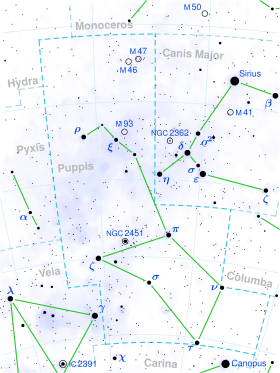HD 60863
Appearance
| Observation data Epoch J2000 Equinox J2000 | |
|---|---|
| Constellation | Puppis |
| Right ascension | 07h 35m 22.89366s[1] |
| Declination | −28° 22′ 09.5735″[1] |
| Apparent magnitude (V) | 4.65[2] |
| Characteristics | |
| Spectral type | B8V[3] |
| U−B color index | -0.43[4] |
| B−V color index | -0.12[4] |
| Astrometry | |
| Radial velocity (Rv) | +3.30[5] km/s |
| Proper motion (μ) | RA: -65.93[1] mas/yr Dec.: -19.73[1] mas/yr |
| Parallax (π) | 14.72 ± 0.67 mas[1] |
| Distance | 220 ± 10 ly (68 ± 3 pc) |
| Absolute magnitude (MV) | 0.46[2] |
| Details | |
| Mass | 3.23[6] M☉ |
| Radius | 2.1[7] R☉ |
| Luminosity | 120[6] L☉ |
| Surface gravity (log g) | 4.29[8] cgs |
| Temperature | 12,680[6] K |
| Rotational velocity (v sin i) | 203[6] km/s |
| Other designations | |
| Database references | |
| SIMBAD | data |
HD 60863 is a class B8V[3] (blue main-sequence) star in the constellation Puppis. Its apparent magnitude is 4.65[2] and it is approximately 222 light years away based on parallax.[1]
In addition to the primary, there are distant companions B, at magnitude 9.13 and separation 36.9", and C, at magnitude 10.44 and separation from B of 43.1".[9]
References
- ^ a b c d e f Van Leeuwen, F. (2007). "Validation of the new Hipparcos reduction". Astronomy and Astrophysics. 474 (2): 653–664. arXiv:0708.1752. Bibcode:2007A&A...474..653V. doi:10.1051/0004-6361:20078357. S2CID 18759600. Vizier catalog entry
- ^ a b c Anderson, E.; Francis, Ch. (2012). "XHIP: An extended hipparcos compilation". Astronomy Letters. 38 (5): 331. arXiv:1108.4971. Bibcode:2012AstL...38..331A. doi:10.1134/S1063773712050015. S2CID 119257644. Vizier catalog entry
- ^ a b Hoffleit, D.; Warren, W. H. (1995). "VizieR Online Data Catalog: Bright Star Catalogue, 5th Revised Ed. (Hoffleit+, 1991)". VizieR On-line Data Catalog: V/50. Originally Published in: 1964BS....C......0H. 5050. Bibcode:1995yCat.5050....0H.
- ^ a b Mallama, A. (2014). "Sloan Magnitudes for the Brightest Stars". The Journal of the American Association of Variable Star Observers. 42 (2): 443. Bibcode:2014JAVSO..42..443M.Vizier catalog entry
- ^ Kharchenko, N.V.; Scholz, R.-D.; Piskunov, A.E.; Röser, S.; Schilbach, E. (2007). "Astrophysical supplements to the ASCC-2.5: Ia. Radial velocities of ~55000 stars and mean radial velocities of 516 Galactic open clusters and associations". Astronomische Nachrichten. 328 (9): 889. arXiv:0705.0878. Bibcode:2007AN....328..889K. doi:10.1002/asna.200710776. S2CID 119323941.
- ^ a b c d Zorec, J.; Royer, F. (2012). "Rotational velocities of A-type stars". Astronomy & Astrophysics. 537: A120. arXiv:1201.2052. Bibcode:2012A&A...537A.120Z. doi:10.1051/0004-6361/201117691. S2CID 55586789. Vizier catalog entry
- ^ Allende Prieto, C.; Lambert, D. L. (1999). "Fundamental parameters of nearby stars from the comparison with evolutionary calculations: Masses, radii and effective temperatures". Astronomy and Astrophysics. 352: 555–562. arXiv:astro-ph/9911002. Bibcode:1999A&A...352..555A. Vizier catalog entry
- ^ David, Trevor J.; Hillenbrand, Lynne A. (2015). "The Ages of Early-Type Stars: Strömgren Photometric Methods Calibrated, Validated, Tested, and Applied to Hosts and Prospective Hosts of Directly Imaged Exoplanets". The Astrophysical Journal. 804 (2): 146. arXiv:1501.03154. Bibcode:2015ApJ...804..146D. doi:10.1088/0004-637X/804/2/146. S2CID 33401607. Vizier catalog entry
- ^ Mason, Brian D.; Wycoff, Gary L.; Hartkopf, William I.; Douglass, Geoffrey G.; Worley, Charles E. (2001). "The 2001 US Naval Observatory Double Star CD-ROM. I. The Washington Double Star Catalog". The Astronomical Journal. 122 (6): 3466. Bibcode:2001AJ....122.3466M. doi:10.1086/323920. Vizier catalog entry

